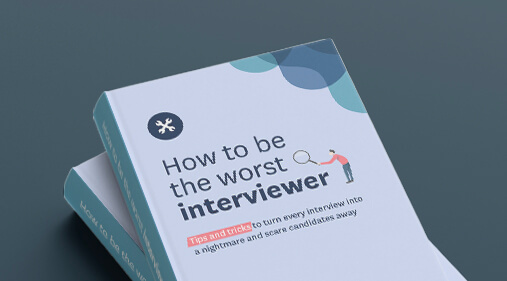How to be the worst interviewer

Meet Joe – Head of Digital Marketing at “Fictional Company”. Joe is really good at his job but has been struggling lately, ever since one of his designers left. He wants to hire a new senior web designer as soon as possible. But, being understaffed, he barely has time to perform his regular tasks. Let alone reviewing resumes carefully, getting ready for interviews and evaluating candidates thoroughly.
If you’re a hiring manager, Joe’s story might ring a bell. If you’re in HR, you must have met a couple of Joe’s along the way. And as a candidate, you’ve been interviewed by a Joe at some point – whether you know it or not. Today, let’s pretend that you are Joe.
It’s Tuesday morning. You enter the office in a rush, coffee in hand. You’re taking a quick look at your calendar. There’s a booked meeting for 11:30 a.m.:
Onsite interview with Cassandra K. – Senior Web Designer position.
“Oh, well, I have another 1.5 hours until the candidate arrives”, you’re thinking. “Great, I’ll focus on work now and check their profile later.” Congrats, your worst interview is about to begin.
Fast forward to 11:30. You have Cassandra wait for at least 30 minutes – even though she was on time. Bonus points if no one reaches out to her while she’s waiting and if there are no signs as to whether your interview will start any time soon.
Eventually, you’re ready to meet Cassandra. Instead of apologizing for the delay, you try to break the ice. Awkwardly, too. “Wow, how tall are you?! It must be so hard to shop for jeans!” She seems slightly uncomfortable; “Hmm, that’s a bad sign”, you say to yourself.
As you walk into the meeting room, you realize that you forgot to prepare your interview questions. You make a quick decision on the fly: start by asking Cassandra to walk you through her work history. This should make up for the fact that you didn’t have the time to check her profile. “Hopefully, she’ll have something interesting to share and we’ll take it from there.” Worst-case scenario, you’ll just improvise.
Cassandra starts talking about her design experience, but your mind is already miles ahead; you want to understand whether she’s the best person for the job right away. A couple of seconds later, you’ve already interrupted her:
Joe: “When exactly did you graduate from college?”
Cassandra: “In 2013.”
Joe (mumbling): “So, you must be 29-30 years old now. Hmm, and still not working in a senior-level role…”
Cassandra: “As I was saying, in my previous job…”
Your phone rings in the middle of her response. You answer, not noticing Cassandra’s furled eyebrows. You keep talking on your phone when it’s obvious it’s a non-urgent, personal call. Ever since your previous designer left, you’ve lost any sense of work-life balance.
About five minutes later, you hang up and turn to Cassandra again. She’s lost her flow but it doesn’t really matter. You can read all about her professional background on her resume anyway; now it’s time to dig into details you can’t find elsewhere. You’re not sure how to start, though. You nervously blurt out the common “tell me about yourself” question – you’re sure you’ve seen that somewhere before. One personal question leads to another:
“Are you married?”
“Why not? Are you afraid of commitment?”
“But, would you like to have kids at some point?”
Cassandra obviously is not feeling at ease with these questions and tries to return the subject to the position she’s applying for. You were right to notice at the beginning of the interview that she’s not very confident. You mull over your report to the hiring team: “I doubt she’ll be able to handle the responsibilities of a senior role – let alone to manage her male team members. That’s OK, though. She might be better off in a more junior role. This way, it’ll be easier for everyone when she’ll have to take a maternity leave.”
You should be closing the interview soon. So you ask Cassandra about her current salary. Instead, she gives you her ideal salary.
Joe: “But, I asked how much you’re making now.”
Cassandra: “This is company information I’d rather not disclose. But, I’m happy to let you know that for this position at your company, I’d expect to get a salary of $X.”
Joe: “That’s not helpful. I want to know your current salary so that I don’t overcompensate you.”
Cassandra: “But don’t you already have a budget for this role? Don’t you pay employees based on the value they bring?”
Joe: “That’s not how businesses work – I don’t blame you, though, for thinking this way. That’s OK – you’re too young, you have a lot to learn.”
You note on your paper how much you think Cassandra is earning now. “She’ll be happy if we offer her the same amount; after all, we also offer free beers every first Friday of the month”, you think.
You stand up and go towards the door when you hear Cassandra behind you: ”Can I ask a few questions about the role?”
You stop and turn back to her: “I’m sorry, we don’t have time”, you reply. “These interviews help us understand if you’re a good fit. But, don’t worry; if you get hired you’ll have plenty of time to ask anything you’d like to know.”
You show Cassandra out. A quick handshake and a polite “Nice to meet you, we’ll let you know of our decision” later, and you close the door. “Interviews are exhausting”, you think, “And the coffee on my desk must have gone cold by now.”
~~The end~~
…but, not so fast. This interview might be over, but the hiring isn’t complete yet. What do you think will happen next?
- Cassandra gets a job offer from “Fictional” but rejects it. She also describes her awful experience in public on Glassdoor.
- Joe gets fired.
- The CEO encourages HR to conduct interviews this way, so the company struggles to hire and retain good employees.
- All of the above.
P.S. 1: The story, all names, characters and incidents portrayed in this article are fictitious. No identification with actual persons (living or deceased), places, buildings and products is intended or should be inferred.
P.S. 2: While the story, all names, characters and incidents portrayed in this article are fictitious, they are quite realistic. If you’re an interviewer, take a look at these illegal interview questions and make sure every member of your hiring team is aware that these are questions you cannot ask during an interview. And if you’re a candidate, share your horrific interview stories with us; you’re not alone.




